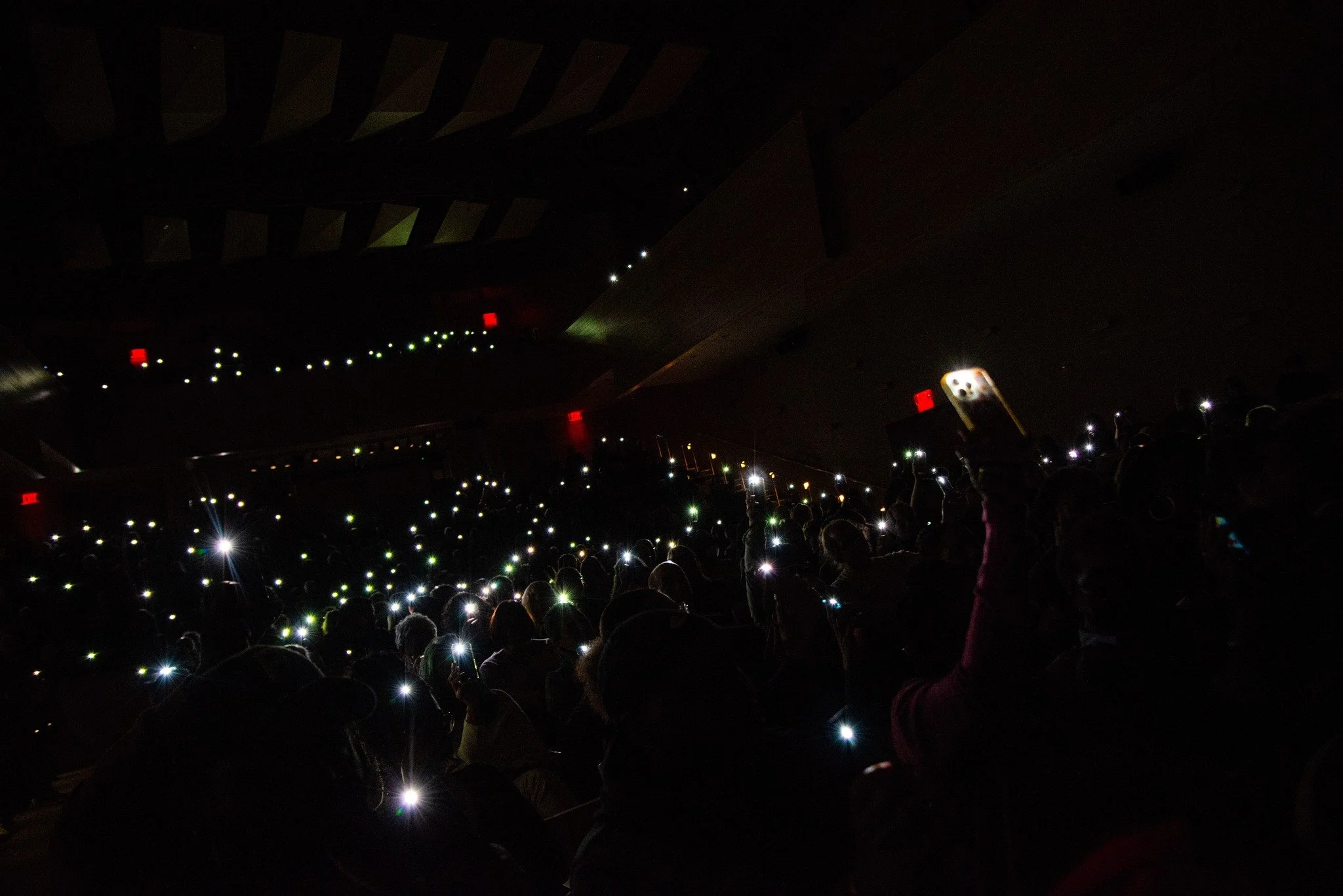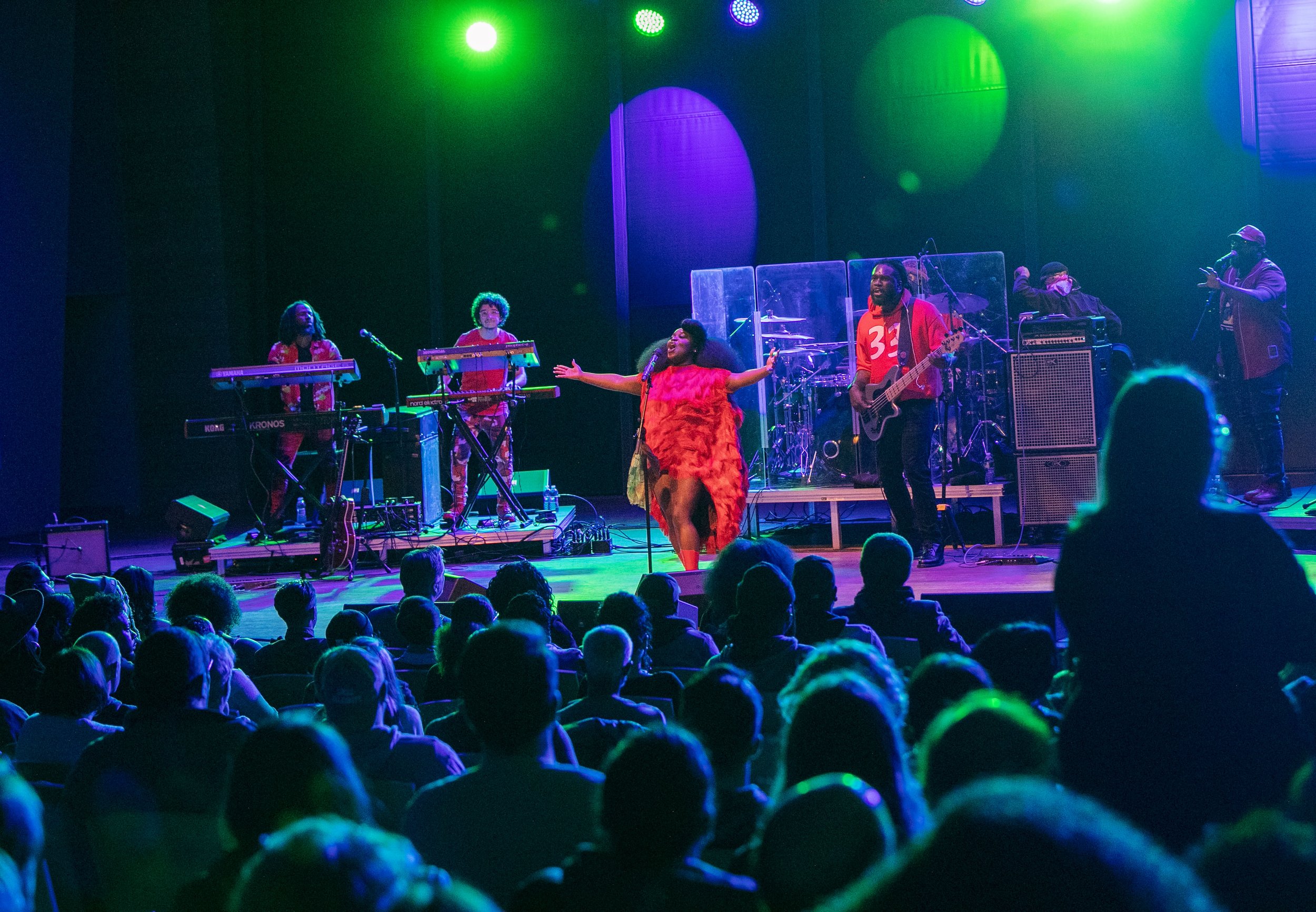All images provided by the Arthur Zankel Music Center.
On Friday, November 10th, Tarriona “Tank” Ball sauntered onto the Arthur Zankel Music Center stage like she owned the place. And that night, she did.
Tank and the Bangas’ one-of-a-kind sound swelled to fill the space. Tank was backed by a four-piece band and trio of back-up singers, and the ingenuity of each individual was evident. Altogether, though, the group was amplified. Tank and the Bangas’ commanded the attention of their audience. Under their spell, the concert hall came alive, coaxed by robust rhythms and breezy beats. Tank and the Bangas’ on-stage symbiosis and infectious energy made for an impressive show distinguished from the classical- and jazz-oriented music events that the space typically hosts.
Tank and the Bangas began making music together in the early 2010s, but they officially entered the music mainstream after winning NPR’s Tiny Desk Contest in 2017, beating 6,000 other entrants for the title. Since then, the group has toured extensively and participated in major American music festivals, including Coachella, the highly-Instagrammed annual event in Southern California. In 2020, Tank and the Bangas was a Best New Artist nominee at that year’s Grammy Awards.
The last few years have only witnessed a swell in well-deserved recognition for Tank and the Bangas. The group has released three studio albums together — Think Tank, Green Balloon, Red Balloon. Their latest project evidences the evolution of their sound and extension of recurring themes, including Blackness, desire, heartbreak, and hope. Whimsical pop culture references lurk throughout Tank’s lyrics like little gems left behind for listeners. The songs are clever and current, but in equal turn earnest and heartfelt. Tracks from Red Balloon accounted for most of the band’s setlist at Zankel. Each member of the group dressed in bright red, and Tank, sporting a billowy red dress, was an on-stage embodiment of the album’s title.
That Friday, the band’s frontwoman commanded the stage with all the confidence of a seasoned musician and all the grace of a sage poet. In fact, poetry is where Tank got her start. She came up in New Orleans’ slam poetry scene as a teenager, where writing and competing provided Tank with a creative outlet.
On the Thursday night just prior to the concert, Tank delivered a moving poetry reading at the Tang Teaching Museum. The event, which celebrated the musician’s release of her first book of poetry, Vulnerable AF, included a question-and-answer period as well as a book signing. Even in a smaller space, Tank’s presence was profound. Each poem was underscored by a keyboard or guitar riff, which often evolved into improvisation. Already melodic in their own right, the combination of spoken word and music made for an intimate, unforgettable event.
Tank and the Bangas’ performance launched Zankel’s Mosaic Music Series, a brand-new approach to programming at the concert hall. Besides shows that feature up-and-coming BIPOC artists, the series includes events oriented around community building. The idea was born out of a collaboration with a Troy-based, Black-led creative agency called Collectiveffort. Zhenelle LeBel, Zankel Director, noted that the Mosaic Music Series is an extension of the Racial Justice Initiative first organized by President Marc C. Connor’s office in 2020. This academic year, the ongoing mission manifested at the Music Center as funding that would allow LeBel and her team to bring in BIPOC artists to Zankel. Spring performances include Makaya McCraven and Sphinx Virtuosi.
Putting underrepresented artists of color on stage at Zankel was just as important to LeBel as reflecting their identities in the audience. “We’ve been trying through this series to reach students on campus,” LeBel explained, “especially the students we don’t really see in this building.”
In order to achieve these goals, the music hall gave away nearly a hundred tickets. The first three rows of the venue, LeBel said, were designated for BIPOC community members who won free tickets through giveaways organized by Collectiveffort.
The audience was also geographically diverse, drawing a crowd from well-beyond Saratoga Springs. Typically, LeBel explained, Tank and the Bangas perform no further north than New York City. This rare upstate appearance drew attendees from as nearby as Albany, Schenectady, and Troy, and as far as Kingston and Southern Vermont, two hours away by car.
LeBel described Tank’s show as a trial run for the Mosaic Music Series. “This is sort of an experiment to see, Does it work?” she said. The consensus following the show was a resounding yes, and Zankel has the numbers to back it up — “We sold out that concert,” LeBel beamed.
Half of the audience that night was accounted for by people who purchased tickets with a Skidmore email address — not just current students, but alumni and faculty as well. The President and Dean of Faculty were among them.
The Mosaic Music Series, LeBel hopes, will set a new trend into motion at Zankel. “Tank and the Bangas was really special,” she affirmed, “We want it to continue.” Friday night was just a glimpse into what might be in store for the future. As LeBel noted, “You don’t see that in that room all that often.”



